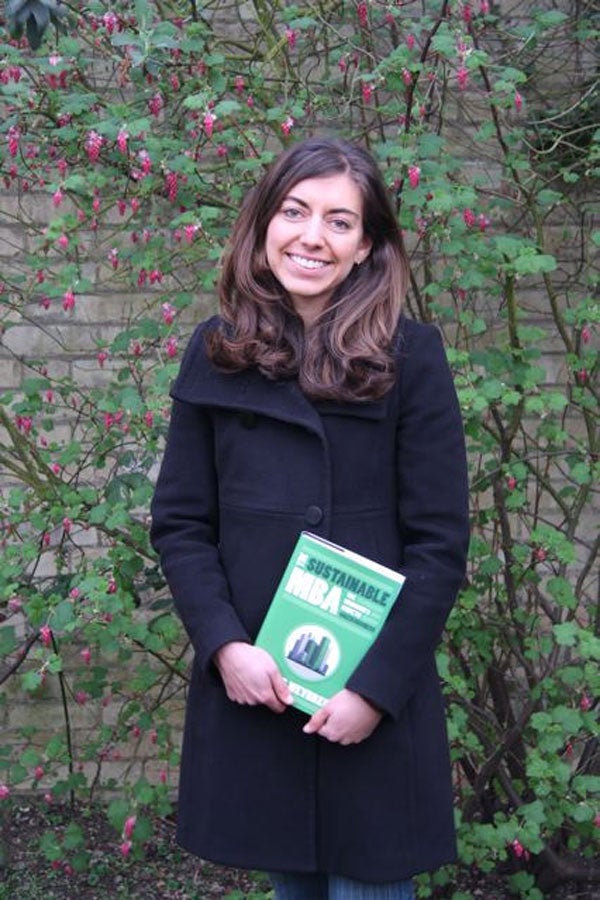A sustainable profit: How to make an MBA green
Angela Neustatter speaks to the author Giselle Weybrecht

When Giselle Weybrecht, 30, enrolled on an MBA at the London Business School she was shocked to realise there were no lessons on how sustainability can work in business. "The view seemed to be that business studies was something quite separate, that sustainability is only relevant to those managers who have the word in their job description," she says.
It was a revelation that led her to write the just-published book, The Sustainable MBA (Wiley). "I set out to write a book to help students and employees understand how to take sustainability from talk to action in business, and to sell the ideas to others on their teams."
Weybrecht, a fellow of the UC Berkeley-based Beahrs Environmental Leadership Programme, had been working at Unesco for several years on sustainability projects, and had seen how divided business is to the world of NGOs and people seeing themselves as doing good. "The attitude was 'business is part of the problem – we won't talk with them', but that is absurd. Business is not just the problem, it is part of the solution, which is something that everyone needs to understand."
With this in mind, she signed on for an MBA at the London Business School to help her understand the business world and its thinking. "I wanted to meet future key players and to see how it might be possible for a new generation to consider ways to introduce sustainable practices into their workplaces," she says.
But none of this was on the curriculum, and she discovered that, where the subject was taught, it was only as an add-on, not connected to the framework in the mainstream MBA curriculum. So, the implicit message is that sustainability is only relevant to those managers who have the word in their job description."
When, in the second year, other students went on company work placements, Weybrecht asked to do her project looking at how sustainability teaching could be embedded into the MBA curriculum. She interviewed professors, members of the faculty, administrators, career service representatives and students from other universities as well as her own.
"Trying to get sustainability incorporated into the curriculum has not been easy," she says. "Discussions on the subject or on corporate social responsibility are often met with scepticism and rolling eyes... Individuals gave reasons for not teaching it such as that it wouldn't be appreciated. Many students were not receptive if they felt it wasn't directly useful to their careers."
Dissatisfied with the attitudes she uncovered, Weybrecht produced a booklet for students, demonstrating how vital it is that businesses think about sustainability and how it can improve profitability. She explained that, to be successful, all parts of a business need to be engaged with these practices, from mail room workers to the CEO.
"Sustainability on its own doesn't mean much," she says. "It is what you do with your skills that matters. We are talking about creating a business culture where everyone contributes and everyone accepts responsibility for what they do, whether it is a small initiative, such as cutting back on some wasteful practice, from introducing double-sided printing to getting manufacturers to use sustainable materials when they make your goods. Or, at the top level, considering what overall changes could make a difference."
The booklet's content kept growing until, as graduation approached, Weybrecht "chanced it" and emailed the publishers Wiley, saying she wanted to expand her work into a book that would be a tool for people to teach or to learn about sustainability at MBA level. She got an immediate commission.
She interviewed almost 130 experts from a wide range of disciplines and countries – NGO leaders, business people at all levels, entrepreneurs, academics, university deans. "I met with so much enthusiasm and I got a lot of positive feedback. It was clear there was a lot of will to do something, but businesses also want to make it relevant to what they are planning to do. Quite a few weren't sure how they could do it. That is where educating the new generation and giving them a toolkit they can use to translate ideas into action is so vital."
Weybrecht is understandably delighted at the attention The Sustainable MBA is getting. It is a detailed exploration of what sustainability actually is, with a good deal of reference to global initiatives, different definitions, what a sustainable company looks like, why it should be of interest and trends around the world. There are "toolbox" sections of practical suggestions and techniques for countering excuses. There are chapters on accounting, ethics, economics, entrepreneurship, finance, marketing, organisational behaviour, operations and strategy.
The book has become an unarguable success story. Positive reviews have been delivered by high school students through to professors, and InterfaceFlor, a leading sustainable manufacturer of modular commercial flooring, ordered 100 copies to provide to its employees.
Weybrecht has organised events for students around the campus and has become a highly sought-after speaker. She is amused by the irony of being asked to talk to business school deans on how they can embed sustainability into their curricula. She is now starting a social enterprise that will focus on providing short courses and webinars aimed at students and businesses wanting to train their employees.
"Some recruiters are already seeking to take on leading-edge students with a knowledge of sustainability," she says. "So there are several reasons why leaders of courses and business schools ought to push sustainability. It is, in its different forms, here to stay and part of the new business reality. Business courses have an important role to play in shaping the next generation."
Join our commenting forum
Join thought-provoking conversations, follow other Independent readers and see their replies
Comments